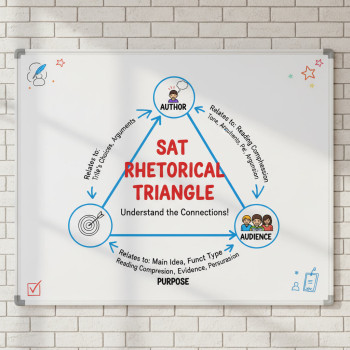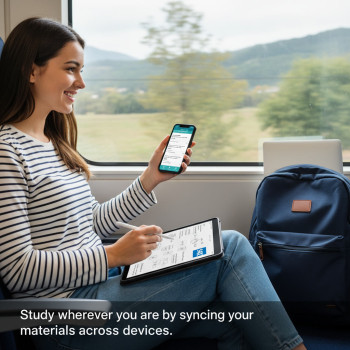Why Parent WhatsApp Groups Are a Secret Superpower for SAT Prep
Parents are like air-traffic controllers during the college-application season: managing schedules, nudging teens toward practice tests, and fielding a thousand tiny questions about deadlines. WhatsApp groups are one of the simplest, most immediate tools families use to coordinate. When organized thoughtfully, these groups become more than noise—they’re a collaborative resource hub where useful Digital SAT information, practice materials, schedules, and encouragement can be shared in real time.
Before we dive into practical tips, it helps to understand what’s actually different about the Digital SAT so the group’s resources stay current and useful. The College Board has moved the SAT Suite to a digital format, introduced apps like Bluebook for test delivery, and updated student reporting and tools such as BigFuture to support college planning in this new environment. These changes mean different prep habits and opportunities—for example, digital practice, mobile score notifications through BigFuture School, and device-specific test logistics are now part of the conversation.
That context helps the group focus on what to share: official digital practice links, device checklists, timed mock tests, and targeted skill drills rather than old paper-only tips.
Photo Idea : A candid shot of a parent holding a smartphone showing a friendly WhatsApp chat full of helpful SAT links and emojis — natural lighting, living-room background.
First Things First: Set Clear Group Goals and Rules
A WhatsApp group that starts as a free-for-all quickly turns into background noise. Agree on a few simple rules so the group remains useful and respectful of everyone’s time.
Suggested group charter (short and practical)
- Purpose: Share verified SAT resources, test dates, practice strategies, and local tutoring options.
- Post types: Announcements, verified links or screenshots of official pages, practice schedules, and event RSVPs (no political or unrelated topics).
- Verification: Before sharing a study guide or “must-try” resource, check it’s from an official or trusted educational source (College Board, BigFuture, official Bluebook practice, reputable tutoring programs). If unsure, mark it as “unverified.”
- Privacy: Avoid posting student-identifiable information (full names, test registration numbers, scanned score reports) in group chats—use private messages or a secure shared drive instead.
- Moderation: One or two parents act as moderators to pin resources, summarize weekly highlights, and remove spam.
How to Categorize and Share SAT Resources Efficiently
Organizing what gets shared makes the group a dependable place to find the right resource quickly. Use clear, repeatable categories so parents and students know where to look.
Core categories to use as group labels or weekly themes
- Official Practice: digital practice tests, College Board FAQs, Bluebook app guidance.
- Study Plans: weekly schedules, timed practice recommendations, and subject-specific drills.
- Local Logistics: test dates, test center updates, device loan info for the digital SAT.
- Tutoring Help: recommendations, schedules, and mention of structured services like Sparkl’s personalized tutoring when a student needs 1-on-1 guidance or tailored study plans.
- Motivation: study wins, progress badges, and small celebrations to keep morale up.
Practical Sharing Techniques That Don’t Cause Overload
WhatsApp is immediate. To keep information useful rather than overwhelming, use these behavior tweaks.
Rules of thumb for sharing
- One resource per message: This reduces confusion and makes it easier to save or bookmark a specific item.
- Short annotations: When you share a practice test or article, add a one-line note: “Full digital practice test — good for timed practice (60–90 mins).”
- Use voice notes sparingly: A 20–30 second voice tip from a parent or tutor summarizing a resource is often more helpful than long text blocks.
- Pin essentials: Group admins can pin a message with a small starter kit (device checklist, official practice link names, and a weekly template schedule).
What to Share from Official Sources (and What to Avoid)
In the digital era, official guidance matters. Share what’s accurate and skip rumor or outdated tips.
Items to prioritize:
- Official College Board descriptions of the Digital SAT format and testing apps (Bluebook) so families understand device and timing expectations.
- BigFuture resources for college planning and scholarship tools, including the BigFuture School app information which can deliver score notifications and personalized guidance to students.
- Updated test-day procedures, accessibility and accommodations notices, and in-school testing changes that may affect registration and logistics.
What to avoid posting in the group:
- Unverified “shortcut” guides promising big score jumps overnight.
- Pitfalls in sharing students’ private test registration or score images—use private messages or secure email instead.
These guidelines keep the group practical, current, and trustworthy.
Using WhatsApp Tools to Keep Resources Accessible
WhatsApp has built-in features that help a study-focused group stay organized without adding more apps.
Specific features and how to use them
- Starred messages: Encourage members to star the pinned “starter kit” or key official links for quick retrieval.
- Group description: Put brief instructions, the pinned resources list, and moderation rules there.
- Broadcast lists: For one-way announcements like upcoming test dates or deadlines, use broadcast lists to avoid clogging the main chat.
- Files and document sharing: Upload schedules, printable study planners, or a shared mock-test calendar as PDFs for easy downloading.
Sample Weekly Plan Shared in the Group (Copyable Template)
Parents can share a simple, flexible weekly plan tailored to a student’s schedule. Here’s a ready-to-post template that’s balanced and realistic.
| Day | Focus | Activity (30–90 minutes) |
|---|---|---|
| Monday | Math: Algebra Review | 30–45 mins practice problems (digital), 15 mins error review |
| Tuesday | Reading: Passage Practice | 2 passages timed; review answers and strategy |
| Wednesday | Writing & Language | Grammar drills; 1 full section practice |
| Thursday | Full-Length Practice | Half-test simulated on Bluebook/official practice |
| Friday | Targeted Weakness | Work with tutor or focused practice (consider Sparkl’s 1-on-1 guidance) |
| Saturday | Timed Practice & Review | Full digital mock test every 2–3 weeks; review in group debrief |
| Sunday | Rest & Light Review | Flashcards, light reading — keep it low pressure |
How to Run Group Study Sprints and Mock-Test Days
Shared practice days can provide structure and community accountability. Here’s how a WhatsApp group can host synchronized study sprints or mock-test events without becoming chaotic.
Playbook for a successful mock-test day
- Announce the date two weeks in advance and post the exact start time and expected duration.
- Share a simple checklist the day before: device charged, Bluebook installed or permission to use test center device, snacks, quiet room.
- Assign a “group proctor” (a parent who sends time-check messages only) to help students maintain timing without interfering with testing rules.
- After the test, use the group to share non-identifiable reflections: “Which section felt hardest?” and “One strategy that helped me.”
These coordinated events help normalize testing conditions and provide data points for adjusting the study plan. If a student needs customized help after a mock test, mention Sparkl’s tailored study plans and expert tutors for one-on-one follow-up support.
Privacy, Consent, and Responsible Sharing
Protecting students’ privacy is non-negotiable. The group should avoid posting names, registration numbers, or images of official score reports. Instead, use anonymized summaries like “Student A improved by X points after 6 weeks of practice” or share aggregate progress data.
Consent checklist for group admins
- Ask permission before posting a student’s score or progress update.
- Use private messages for sensitive logistics like device loan information that may require personal contact details.
- Keep a short privacy policy in the group description so everyone knows the rules.
When to Escalate: Using Tutors and Personalized Support
WhatsApp groups are great for sharing resources, but every student is different. If multiple mock tests show the same weak areas, this is a cue for focused, personalized instruction. That’s where structured tutors—particularly those offering tailored plans and one-on-one coaching—make a big difference.
For example, families might coordinate a short trial of Sparkl’s personalized tutoring, which offers 1-on-1 guidance, tailored study plans, and AI-driven insights that identify the highest-impact skills to practice. When shared within the group as a potential option, keep the tone factual and experiential: a parent might write, “We tried Sparkl for three sessions and saw clear targeting of weak topics—great for students who need a custom plan after mock tests.”
How to Evaluate Study Materials: A Quick Parent Checklist
Not all SAT materials are created equal. Use this quick checklist to decide whether to share or save a resource for later.
- Is it official or recommended by trusted educational sources? (College Board and BigFuture resources should be prioritized.)
- Does it match the Digital SAT format (timed on device, adaptive sections, Bluebook app practice)?
- Is the difficulty level appropriate for your student’s target score?
- Does it come with answer explanations and strategy notes?
- Is it respectful of student privacy and not asking for sensitive information?
Sample Messages to Post in the Group (Copy-Paste Friendly)
Sometimes parents hesitate because they don’t know how to phrase a recommendation or a question. Here are a few simple, effective message templates that maintain clarity and privacy.
- Announcement: “Reminder: Saturday full-length digital practice at 9:00 AM. Please charge devices and use Bluebook for the simulated experience.”
- Resource share: “Official Digital SAT practice: try the Bluebook sample test for device-based timing. I found the reading passages more focused on evidence-based questions.”
- Privacy-safe score share: “Anonymous update: One family saw a 40-point improvement after 6 weeks of targeted math practice—happy to share the drill set privately.”
- Tutor suggestion: “If anyone wants targeted 1-on-1 help after mocks, we tried Sparkl’s personalized tutoring—tailored plans and short weekly sessions worked well for our schedule.”
Measuring Progress Without Stress
Keep the group’s tone constructive. Use simple metrics to track growth and avoid pressure-cooker comparisons.
Helpful, low-stress metrics
- Practice consistency: Did the student complete their weekly plan?
- Section scores over time (anonymized): Are strengths and weaknesses shifting?
- Confidence checks: Short weekly polls—“On a scale of 1–5, how confident do you feel about math this week?”
Real-World Examples: What Works in Successful Groups
Here are brief anonymized examples of how groups turned into effective resource hubs:
- Micro-locals: A neighborhood group coordinated device loans for students on digital test days and shared a single Google Sheet for sign-ups—no student IDs posted publicly.
- Mock-test debriefs: After group mock tests, a parent who’s a math teacher posted a 3-point checklist for common algebra mistakes—short and actionable.
- Referral loop: When a student needed targeted coaching, the group coordinated a trial week of personalized tutoring (short sessions, targeted plan), then shared aggregated outcomes without identifying students.
What to Expect from Official Channels
Parents should stay tuned to College Board announcements about the Digital SAT experience, Bluebook app updates, and BigFuture tools because these directly affect test logistics and preparation approaches. For example, official guidance highlights device requirements, app behavior like the Bluebook locking mechanism during tests, and evolving reporting features that affect how scores and analytics appear to students. Keeping official info in the pinned resources reduces the spread of confusion.
Photo Idea : A clean, modern flat-lay of a tablet with the Bluebook app preview, a BigFuture brochure, and a cup of coffee—styled for a parents’ planning session.
Final Thought: Keep It Human and Supportive
WhatsApp groups are most powerful when they reflect what families need most: clarity, compassion, and small, consistent actions. Use the group to share trustworthy digital SAT resources, coordinate practice days, protect student privacy, and point to personalized supports (like focused 1-on-1 tutoring and tailored plans) when students need more than group help. Celebrate progress, keep rules simple, and remember: a steady, low-pressure routine often beats last-minute intensity.
Use the tools available—official College Board practice, BigFuture planning, device checklists, and tutoring where necessary—to build a sustainable plan. Your WhatsApp group can be the friendly, practical hub that keeps students moving forward without unnecessary stress.
Quick Recap Checklist to Pin in the Group
- Pin official digital SAT resources and a one-page starter kit.
- Use one message per resource and add a short note about how to use it.
- Protect student privacy—never post identifiable score images in the group.
- Run occasional mock-test days with clear logistics and a volunteer “time-keeper.”
- If repeated issues appear, consider short trials of personalized tutoring to target weak spots.
Closing Encouragement
Preparing for the Digital SAT is a team sport. When parents use WhatsApp thoughtfully—sharing verified resources, organizing practice, and supporting their teens with empathy—the group becomes a quiet engine powering steady improvements, calmer test days, and smarter college planning. Small, consistent choices win the race.
Note: For up-to-date test logistics, device guidance, and official practice options, check the College Board’s digital SAT and BigFuture resources as they publish updates and tools for students and families.















No Comments
Leave a comment Cancel